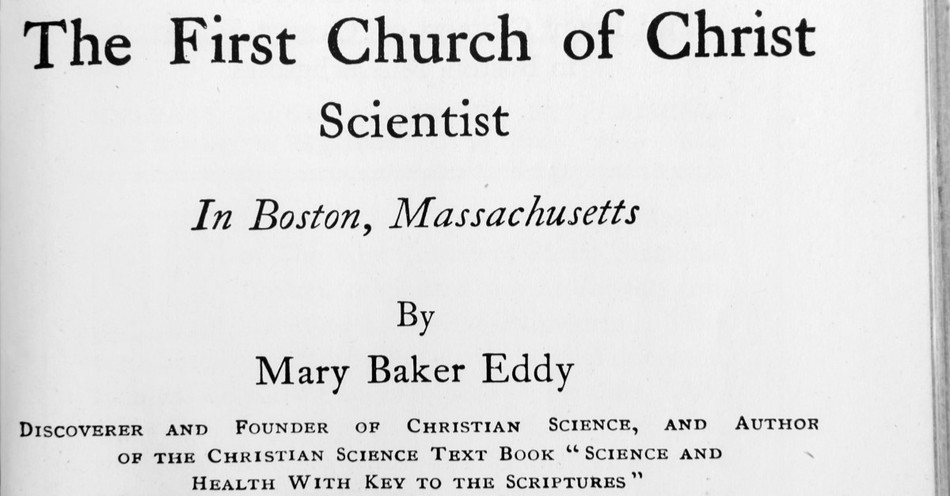As Christians seek to share the Gospel in a pluralistic world, we often encounter religious groups we aren’t sure how to categorize. They may use language that sounds Christian, but they say things that we haven’t heard in our evangelical churches before. In addition, their name causes us to confuse them with other groups.
One such group is Christian Science. They use the Bible but also use another book alongside the Scriptures. They talk about Jesus and use some Christian language. Are they Christian, or do their beliefs contradict God’s word? And what is the relationship between Christian Science and Scientology? Are they related, or are they two completely different beliefs?
Who Founded Christian Science?
Christian Science traces its beliefs and practices to its founder, Mary Baker Eddy. Eddy was born in New Hampshire in 1821 to parents who were Congregationalists. Her parents took their faith seriously and evidenced a strain of Puritan Calvinism, which was waning but still present in New England.
Eddy experienced numerous tragedies in her 20s. Eddy’s brother Albert, her closest sibling, died when she was 20. She married three years later, but her husband died from scarlet fever six months after the wedding. Eddy’s first son was born three months after her husband’s death. She was engaged again in 1849. Her mother died during the engagement, and her fiancé passed away three months later.
Throughout her life, Eddy dealt with a myriad of unexplained illnesses. In 1861, her second husband, Daniel Patterson, contacted a Mesmerist (someone who uses hypnosis to heal people), Phineas Parkhurst Quimby, who had developed a reputation for curing people without medicine. One of her biographers, Lyman Pierson Powell, reports that Eddy visited Quimby in 1862 and experienced temporary relief from her condition. She learned Quimby’s methods over the next several years and wrote her own ideas about healing. Quimby was hostile towards religion, so Eddy added biblical and spiritual emphases to his teachings.
According to Christian Science’s website, Eddy suffered a life-threatening accident in 1866. After the accident, she read the account of one of Jesus’s healings in the Gospels and experienced her own healing. Through studying the Bible, “It became clear to her that spiritual healing was based on divine laws of God, Spirit. She proved that these laws could be applied to anyone to heal every form of human suffering and sin.”
In the early 1870s, she moved to Lynn, Massachusetts. She gathered a group of eager learners and started teaching her spiritual healing principles there. She founded the Christian Science Association in 1875. The same year, she published her first book, Science and Health with Key to the Scriptures, which is free to read on the Christian Science website. Christian Scientists read this book alongside the Bible and refer to the book as their “pastor.”
What Are the Core Beliefs of Christian Science?
Christian Science claims that it does not have a doctrinal or theological confession. Instead, Eddy offered six brief points that explain the “religious tenets” of Christian Science.
1. As adherents of Truth, we take the inspired Word of the Bible as our sufficient guide to eternal Life.
2. We acknowledge and adore one supreme and infinite God. We acknowledge His Son, one Christ; the Holy Ghost or divine Comforter; and man in God’s image and likeness.
3. We acknowledge God’s forgiveness of sin in the destruction of sin and the spiritual understanding that casts out evil as unreal. But the belief in sin is punished so long as the belief lasts.
4. We acknowledge Jesus’ atonement as the evidence of divine, efficacious Love, unfolding man’s unity with God through Christ Jesus the Way-shower; and we acknowledge that man is saved through Christ, through Truth, Life, and Love as demonstrated by the Galilean Prophet in healing the sick and overcoming sin and death.
5. We acknowledge that the crucifixion of Jesus and his resurrection served to uplift faith to understand eternal Life, even the allness of Soul, Spirit, and the nothingness of matter.
6. And we solemnly promise to watch, and pray for that Mind to in us which was also in Christ Jesus; to do unto others as we would have them do unto us; and to be merciful, just, and pure.
What is the Difference between Christian Science and Scientology?
One point of confusion for many Christians interacting with Christian Scientists is that they confuse it with Scientology. Scientology enjoys a higher profile than Christian Science thanks to several celebrity adherents.
While their name may sound similar, Christian Science and Scientology do not have a common origin. Scientology was founded by L. Ron Hubbard when he published his book Dianetics: The Modern Science of Mental Health in 1950, almost a century after Eddy established Christian Science.
Christian Science and Scientology differ on important points.
Christian Science appeals to the Bible. Its adherents believe in God as the creator and acknowledge Christ as the Son of God. Christian Science believes in divine healing that flows from the pages of Scripture.
Scientology holds none of these beliefs. Scientology focuses on unleashing the mind to fulfill human potential. It also believes that the person free from an imprisoned life, or a “thetan,” is a creator.
Christian Science claims to be faithful to the Bible, while Scientology makes no pretenses of being Christian.
Does Christian Science Uphold or Contradict Biblical Doctrine?
While Christian Science attempts to build its beliefs on the Bible, it abandons faithfulness to historic Christian doctrine in multiple ways.
First, Christian Science does not hold to the historic doctrine of the Trinity. In Science and Health, Eddy said that the Trinity “suggests polytheism, rather than the one ever-present I AM.” Christians believe that one God eternally exists in three distinct persons–God the Father, God the Son, and God the Holy Spirit. Each person is equal in deity while retaining distinct personal characteristics. (2 Cor. 13:14) Instead, Christian Science insists on the oneness of God, denying the full deity of the Son and the Spirit.
Christian Science further dilutes the Bible’s teaching on the Trinity by dividing the man Jesus and “the Christ Principle.” The title, “Christ,” refers to Jesus’s office as Messiah. Jesus did not simply claim that title for himself during his time on earth. He has held that office for all of eternity and will continue to hold it for all eternity. One day, every knee and tongue will bow and confess that he is the Lord (Phil. 2:8-9).
Christian Science’s view of matter stands as another important point of departure from biblical teaching. They believe that the physical world is an illusion. Eddy claimed that “matter is mortal error” and that “matter is the unreal and temporal.” This repeats an ancient heresy called Gnosticism, which the Apostles attacked in the pages of the New Testament.
When God created the physical world, he looked upon everything he created and declared that it was good. God’s insistence on the goodness of the world he made directly contradicts Christian Science teaching.
Furthermore, if matter is unreal, Jesus did not live in this world. In the Gospel of John, the Apostle said that the Lord Jesus “became flesh” and dwelt among us. (John 1:4) In 1 John 1:1, he said that they heard Jesus with their ears, saw him with their eyes, and touched him with their hands. If Jesus did not really live in this world, then he could not have died for us, and we are still in our sins.
An old joke has made the rounds in Christian circles for the last couple of decades. It said that Christian Science was like the cereal Grape Nuts. The cereal is neither grapes nor nuts, just as Christian Science is not Christianity or Science. The religion founded by Mary Baker Eddy may not fit the precise definition of a cult since it does not exercise social control over its members. However, its departure from Christian doctrine puts it outside historic Christianity. Christian Science claims the Bible as one of its inspirations and uses Christian vocabulary; in fact, it redefined biblical ideas until it does not resemble the faith delivered to the saints (Jude 3).
Scott Slayton writes at “One Degree to Another.”
© Getty Images/Stephen Barnes
Scott Slayton writes at “One Degree to Another.”









